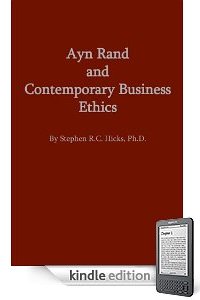My essay on “Ayn Rand and Contemporary Business Ethics” is available in e-book format. The essay has gotten very good mileage, so to speak, since being first published in The Journal of Accounting, Ethics & Public Policy. It has been translated into German, Portuguese, Spanish, and Korean, and in English it is available at the Social Science Research Network and in a monograph edition at Amazon.

The abstract: “Most traditional systems of business ethics hold that business is essentially amoral or immoral. Such systems share a common assumption: that conflicts of interest—either because of scarce resources or innate human badness or sin—are basic to the human condition. That assumption of fundamental conflict is rejected in Ayn Rand’s system of ethics. Rand, by contrast, emphasizes the power of human reason to shape one’s character and beliefs, and it makes fundamental reason’s power to develop new resources and cultivate win-win social relationships. In this essay, Stephen Hicks applies Rand’s radical ethical perspective to key issues in business ethics and contrasts it to those perspectives based on the assumption of the amorality or immorality of business.”
Related: My article in Journal of Private Enterprise connecting business success traits to virtue ethics.
Very interesting, thank you.
I don’t think there has been a time in human history when entrepreneurs have been so screwed, attacked by governments, and their regulations, norms, taxes, progressive morals, (“meta-moral” disconnected from the history of economics and trade as it has developed since Mesopotamia), as they are right now. In France, many young people are discouraged, many bosses are demoralized*. Private companies could greatly improve things (in California for example, certainly the least free state in America, no improvement will be possible, at any level of society outside of private enterprise, freedom of enterprise and contract).
No improvement in education will occur outside of private society.
In France, the world of culture must be privatized and not in the hands of an ideologically corrupt ministry. In the world of culture and art, any free spirit, or more liberal-conservative, can have professional problems, cancel-culture is a reality.
*A friend’s son-in-law created a micro-enterprise to develop optical technology for hospital equipment, what the administration and the tax made him go through is beyond human understanding, and this while we need this technology in France)
best!